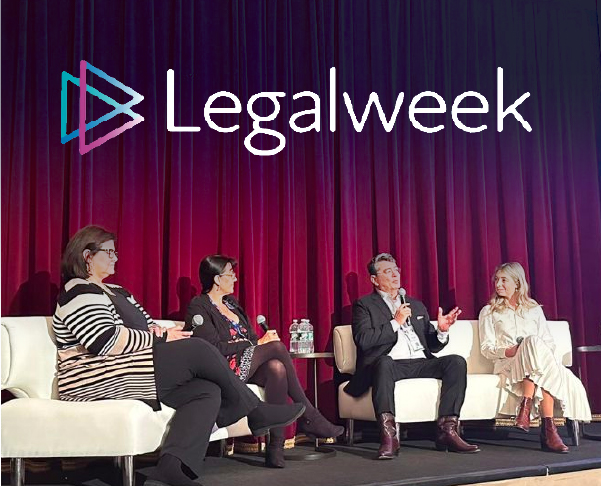
Blog
Recapping Legalweek 2023: In Conversation with Koch, Yokogawa and Hitachi Vantara
29 March 2023 | Eleanor Lightbody
Last week, it was a pleasure to be back in New York for the highly anticipated Legalweek 2023! No doubt the highlight of the week was being joined onstage by industry leaders from Koch Industries, Hitachi Vantara, and Yokogawa Corporation of America, for a discussion on how AI is helping businesses to automate legal processes, save cost and drive business growth.
Now that I’m back in London, I wanted to share some of my key takeaways from the panel.
Transforming Legal from Cost Centre to Value Creator
With so many challenges facing businesses today, from increased market volatility and budget cuts to renewed efficiency pressures and enhanced regulatory thresholds, I opened our discussion by asking the panellists what had driven their decision to adopt AI. A common theme was quick to emerge – in-house legal departments are under unprecedented pressure to deliver more value to their business with existing resource. As Jeannine Moran, Director of Legal and Compliance Operations at Hitachi Vantara, aptly summarised: “The business wants more and more out of the tools we are using, and to make the most of them.”
Laura Pickle, CIO & Discovery Director at Koch, went on to explain that “A lot of people are saying to do more with less. We don’t like to think of things like that. For us, it is around how do you get the right work to the right place most efficiently?” For Koch, the second largest private company in the US, this drive for efficiency in Legal has involved using Luminance’s AI to automate routine daily tasks, such as contract drafting and review. She added that with Luminance’s AI rapidly analysing legal and enterprise data, pinpointing key information that could otherwise be siloed across the business, Koch’s legal department has been able to unlock a key commercial advantage for the business: “Historically, Legal has been a cost centre, but over the last three years we’ve been trying to show that with this data, and by making data-driven decisions, we can drive cost down.”
George Nino, Executive VP and GC at Yokogawa, supported Laura’s view that AI can turn contract repositories into key business assets, explaining that, “The data in our documents is the lifeblood of the company. With Luminance, we now have a more thoughtful approach to managing those contracts.” He also pointed out how lawyers’ time can be better utilised by adopting advanced technologies like AI: “Luminance leverages our time so we can think about more strategic matters, rather than negotiating NDAs from scratch. There are now whole new areas where Legal can come in as a strategic, trusted advisor for the company.”
Bringing the Business Together with AI
Perhaps the most prevalent topic in the discussion was how AI-powered legal process automation is quickly becoming a tool for the entire business, connecting all different functions with the legal department and facilitating effective collaboration.
Jeannine was quick to offer an example of how Luminance’s AI is delivering business-wide value: “So right now we’ve got Finance using Luminance so we can find out earlier in the process anything that is causing us not to recognise revenue. This gives them a seat at the table rather than having to wait until after the contract has been negotiated to start trying to figure out, okay, what does this mean for our financials? What revenue can we recognise today versus 12 months versus 3 years down the line?” With AI-powered insights now at the fingertips of other teams across the business, “Luminance is helping bring that other department in as a business partner. So that is what I use in terms of, we’re not just a cost centre, we’re helping with the bottom line.”
Notably, Jeannine highlighted how empowering non-legal teams to independently generate their own contracts with Luminance, safe in the knowledge that they are using legal-approved templates, is accelerating the whole commercial process: “The goal was from inception to signature, to not have Legal touch it [a contract] unless we needed to…. In 5 minutes, we can literally now get a signed NDA from start to finish.”
Laura agreed that the business case for AI at Koch was much the same, highlighting how non-legal business functions at the company are benefitting from AI-powered contract negotiation. This is where Luminance will instantly highlight which words, clauses or paragraphs within a contract are acceptable (green), in need of review (amber) or non-compliant (red) based on industry benchmarks or the organisation’s internal standards.
As Laura explained: “For the Traffic Light Analysis, we didn’t want it to become a legal tool, we wanted it to be a business tool. The highlighting helps our business, gives them a fallback clause, but it also tells them why. So, they’re getting educated. A sales guy is looking through it and learning every time which clauses are going to be agreed to because he can see there in the tool why something is red and which fallback would be okay.”
AI Isn’t the Future – It’s the Now
In the current climate, AI that facilitates time-savings and drives efficiency across all parts of the business is crucial. With so many in-house legal teams turning to AI, it is no longer something to think of as ‘the future’. Frankly, there’s no better way of putting it as George did on our panel: “Anyone here looking at what tools should be used now for legal or corporate departments – it needs to be a tool like Luminance. Because the train is leaving the station and accelerating at an incredible pace right now.”